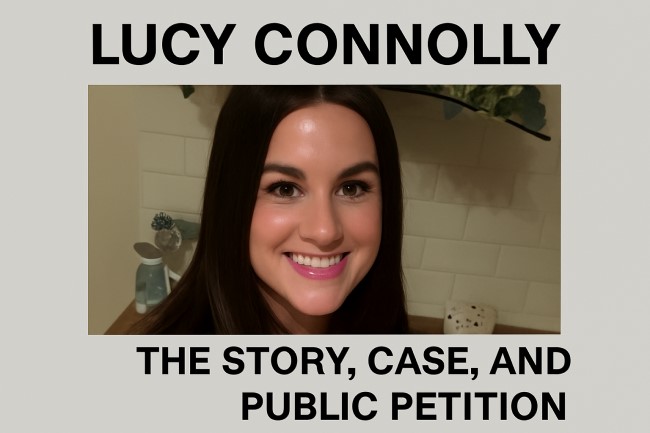Lucy Connoly: The Story, Case, and Public Petition

The name Lucy Connoly has recently gained wide attention across the United Kingdom and beyond. Once a relatively unknown figure, she became a controversial public personality after being convicted for a social media post made in the aftermath of a tragic incident in Southport. Her case sparked nationwide debates about free speech, hate speech laws, public accountability, and political justice. Alongside the legal proceedings, a Lucy Connoly petition emerged, adding more fuel to the discussions on whether her punishment was just or excessive.
This article provides an in-depth analysis of her case, background, trial, sentence, appeal, and the public petition that continues to circulate.
Who Is Lucy Connoly?
Personal Background
Lucy Connoly was known as a former childminder from Northampton, England. Married to a Conservative councillor, she lived a life outside of the public spotlight until her online activity propelled her into national headlines.
Rise to Public Attention
Her name became widely known following a single post on social media platform X (formerly Twitter) after the Southport tragedy in July 2024. That post was interpreted by many as incitement to hatred and violence, and within hours it was shared, criticized, and reported across the media.
The Southport Incident and Connoly’s Post
The Southport Tragedy
In July 2024, a shocking attack at a holiday club in Southport left three children dead. The entire country was shaken, and emotions were high as the news spread.
Connoly’s Reaction
On the very same day, Lucy Connoly made a social media post that called for mass deportation and even suggested violence against certain communities. The post stayed online for over three hours, amassing hundreds of thousands of views before she deleted it. Despite her attempts to remove it, screenshots had already gone viral.
Why It Sparked Outrage
Her words were considered dangerous and inflammatory, particularly because they came at a time of national grief. Many people argued that her statement crossed the line between opinion and hate speech, leading directly to her arrest and prosecution.
The Legal Case Against Lucy Connoly
Charges
Connoly was charged under Section 19 of the Public Order Act 1986 for publishing material intending to stir up racial hatred. This is one of the most serious offences under British hate speech laws.
Trial and Conviction
In September 2024, she pleaded guilty. The judge categorized the offence as the highest level under the sentencing guidelines, emphasizing the potential harm caused by her post.
Sentencing
In October 2024, Lucy Connoly was sentenced to 31 months in prison. The judge highlighted aggravating factors such as the sensitive timing, the reach of her post, and the directness of her words.
The Appeal Process
Grounds of Appeal
Connoly’s legal team argued that her sentence was too severe, claiming that mitigating factors such as her remorse, quick deletion of the post, and personal struggles were not given enough weight.
Court of Appeal Decision
In May 2025, the Court of Appeal rejected her appeal. Judges stated that her post was highly damaging and that the sentence was within the correct legal range.
Release from Prison
Time Served
Although sentenced to 31 months, Connoly was released in August 2025 after serving around 10 months. This was in line with the system of serving part of a sentence in custody before release under license.
Conditions of Release
Her release came with strict conditions. She remains under supervision for the remainder of her sentence, and any violation could result in a return to prison.
Public Reaction to the Lucy Connoly Case
Divided Opinions
The case of Lucy Connoly has divided opinion across the country. Some believe she was rightly punished for spreading harmful and dangerous rhetoric. Others argue that the punishment was extreme, framing her as a victim of an unfair justice system.
Free Speech vs. Hate Speech
The case highlights the ongoing debate in the UK: where does free speech end and hate speech begin? Supporters of Connoly claim her words, however offensive, should fall under free expression. Critics insist that her post clearly endangered communities and encouraged hostility.
The Lucy Connoly Petition
Origins of the Petition
Following her conviction, a Lucy Connoly petition was launched online. It quickly gained thousands of signatures from people who believe she was unfairly targeted and treated more harshly than others in similar cases.
Purpose of the Petition
The petition demands that her conviction be reviewed, her sentence reduced, and that lawmakers consider reforming hate speech laws. Those supporting the petition argue that justice should not be influenced by political pressure or media outrage.
Impact of the Petition
While the petition has not altered the legal outcome, it has kept Connoly’s name in the headlines and further fueled public debate. For many, it represents a larger cultural struggle over justice, equality, and freedom of expression.
Political and Social Implications
Political Reactions
Politicians, activists, and commentators have weighed in heavily on the case. Right-leaning groups often use her case to highlight what they describe as “two-tier justice,” suggesting that certain views are punished more harshly than others.
Social Media Campaigns
Social platforms continue to be battlegrounds for arguments both supporting and opposing Connoly. Hashtags related to her case and to the Lucy Connoly petition often trend during key legal events.
Broader Lessons from the Case
The Power of Social Media
The Connoly case demonstrates how a single online post can alter an entire life. What was written in moments of anger or frustration had devastating personal and legal consequences.
The Role of Justice
It also forces society to confront difficult questions: how should justice balance freedom of speech with protection from hate? And how should the law handle posts that, while offensive, may reflect common sentiments in heated times?
Conclusion
The story of Lucy Connoly is not just about one woman’s social media mistake. It is a wider reflection of society’s struggle to define the limits of free speech, the severity of hate speech laws, and the role of justice in a divided political climate.
Whether one sees her as a cautionary tale, a victim of excessive punishment, or a threat to social harmony, there is no denying that Lucy Connoly’s case has left a lasting mark on public discourse.
The ongoing Lucy Connoly petition ensures that debates around her case are far from over. It remains to be seen whether her story will lead to legal reforms, political change, or simply stand as a powerful reminder of the consequences words can carry in the digital age.



